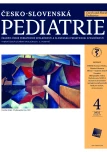-
Články
- Vzdělávání
- Časopisy
Top články
Nové číslo
- Témata
- Kongresy
- Videa
- Podcasty
Nové podcasty
Reklama- Kariéra
Doporučené pozice
Reklama- Praxe
Genetická různorodost monogenního diabetu na Ukrajině
Autoři: Globa Evgenia 1; Zelinska Natalia 1; Lebl Jan 2; Franco De Elisa 3; Colclough Kevin 4
Působiště autorů: Ukrainian Scientific and Practical Center of Endocrine Surgery, Transplantation of Endocrine Organs and Tissues of the Ministry of Health of Ukraine, Kyiv, Ukraine 1; Department of Pediatrics, 2nd Faculty of Medicine, Charles University in Prague and University Hospital Motol, Prague, Czech Republic 2; Institute of Biomedical and Clinical Science, University of Exeter Medical School, Exeter, United Kingdom 3; Exeter Genomics Laboratory, Royal Devon and Exeter NHS Foundation Trust, Exeter, United Kingdom 4
Vyšlo v časopise: Čes-slov Pediat 2022; 77 (4): 214.
Kategorie: Abstrakt z Ukrajiny
doi: https://doi.org/10.55095/CSPediatrie2022/034Background
Monogenic diabetes encompasses at least 70 different genetic subtypes that can be broadly categorized into neonatal diabetes, non-syndromic monogenic diabetes (maturity-onset diabetes of the young – MODY ), diabetes occurring as part of a monogenic syndrome with additional extra-pancreatic features, and monogenic autoimmune diabetes. The aim of this study is to elucidate the etiology and frequency of monogenic diabetes in a large diabetes database in Ukraine diagnosed after 9 months of age.
Methods
We established a Monogenic Diabetes Register to identify patients with a clinical suspicion of MODY . 141 patients with diabetes diagnosed between 9 months and 32 years were selected from 138 unrelated families for genetic testing. The majority were selected from a Ukrainian Pediatric Diabetes Register (UPDR) which covered all Ukrainian regions (excluding occupied territories). All patients had comprehensive genetic testing for mutations in all known monogenic diabetes genes using targeted next generation sequencing.
Results
As of 2020, the UPDR contained 10,598 children aged <18 years with T1DM (1 in 710), 51 with T2DM (1 in 147,724) and 65 (1 in 115,906) with neonatal diabetes. 134/141 (95%) patients tested were diagnosed <18 years. A genetic diagnosis was confirmed in 63/141 (44.6%) probands with a clinical suspicion of MODY . The median age at diagnosis was 11 years [IQR 6.7, 15.0] and 72% were not treated with insulin. 32% of probands had no parent with diabetes or impaired glucose tolerance. Mutations in non-syndromic diabetes genes were identified in 54/63 monogenic patients (85.7%) with GCK the most common genetic cause overall (46.1%), followed by HNF1A (GCK (n=29), HNF1A (n=15), HNF4A (n=5), ABCC8 (n=3) and INS (n=2). All patients with HNF1A, HNF4A and ABCC8 diabetes were able to transfer to sulfonylureas with significant improvement in glycemic control. Mutations in the syndromic diabetes genes HNF1B, WFS1, INSR, AIRE and MAFA accounted for the remaining 14.3% of cases. Some patients with MODY had atypical clinical presentation. E.g. one patient with the INS mutation p.(Arg46Gln) had severe hypoglycaemia, and the patient with a MAFA p.(Ser64Phe) was diagnosed with diabetes aged 28 years and subsequently developed hyperinsulinism due to an insulinoma.
Conclusions
Genetic subtypes of monogenic diabetes within the Ukrainian population are diverse, and comprehensive testing of all genes is required for accurate diagnosis and improvement in clinical care.
Štítky
Neonatologie Pediatrie Praktické lékařství pro děti a dorost
Článek Co jsme psaliČlánek EditorialČlánek DystrofinopatieČlánek Sepse u dětíČlánek Pediatrická poezie
Článek vyšel v časopiseČesko-slovenská pediatrie
Nejčtenější tento týden
2022 Číslo 4- Horní limit denní dávky vitaminu D: Jaké množství je ještě bezpečné?
- Isoprinosin je bezpečný a účinný v léčbě pacientů s akutní respirační virovou infekcí
- Syndrom Noonanové: etiologie, diagnostika a terapie
-
Všechny články tohoto čísla
- Ze sbírky moderního českého a slovenského umění
- Co jsme psali
- Purkyňova cena za rok 2022 byla udělena prof. MUDr. Otto Hrodkovi, DrSc.
- Editorial
- Gregor Mendel slaví 200 let: ze zahrad augustiniánského kláštera v Brně až ke kauzální léčbě monogenně podmíněných chorob
- Dystrofinopatie
- Gregor Mendel a řízení růstu dítěte: geny, molekuly a pediatrická klinická praxe
- Genetická různorodost monogenního diabetu na Ukrajině
- Syndrom intelektuálního postižení související s DYRK1A
- Fabryho choroba v dětském věku – přehled a kazuistika
- Klinický fenotyp a genetická diagnostika raritného syndrómu cutis laxa u polystigmatizovaného novorodenca
- Pacient s Williamsovým–Beurenovým syndromem v ordinaci dětského lékaře
- Diferenciální diagnostika mikroskopické hematurie
- Hypertermie, její příčiny a rizika z pohledu patofyziologa
- Sepse u dětí
- Za MUDr. Janem Škovránkem, CSc.
- Pediatrická poezie
- Česko-slovenská pediatrie
- Archiv čísel
- Aktuální číslo
- Informace o časopisu
Nejčtenější v tomto čísle- Sepse u dětí
- Diferenciální diagnostika mikroskopické hematurie
- Hypertermie, její příčiny a rizika z pohledu patofyziologa
- Dystrofinopatie
Kurzy
Zvyšte si kvalifikaci online z pohodlí domova
Autoři: prof. MUDr. Vladimír Palička, CSc., Dr.h.c., doc. MUDr. Václav Vyskočil, Ph.D., MUDr. Petr Kasalický, CSc., MUDr. Jan Rosa, Ing. Pavel Havlík, Ing. Jan Adam, Hana Hejnová, DiS., Jana Křenková
Autoři: MUDr. Irena Krčmová, CSc.
Autoři: MDDr. Eleonóra Ivančová, PhD., MHA
Autoři: prof. MUDr. Eva Kubala Havrdová, DrSc.
Všechny kurzyPřihlášení#ADS_BOTTOM_SCRIPTS#Zapomenuté hesloZadejte e-mailovou adresu, se kterou jste vytvářel(a) účet, budou Vám na ni zaslány informace k nastavení nového hesla.
- Vzdělávání




